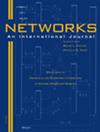可探索边和顶点不确定性下最小生成树问题的特例
IF 1.3
4区 计算机科学
Q4 COMPUTER SCIENCE, HARDWARE & ARCHITECTURE
引用次数: 0
摘要
本文研究了可探索不确定性下的最小生成树问题以及该问题的相关顶点不确定性版本。我们特别考虑了包括仙人掌图在内的特殊实例类型,并提供了随机算法。我们介绍了在不确定条件下寻找最小权重生成星的问题,并证明没有算法能达到恒定的竞争比。本文章由计算机程序翻译,如有差异,请以英文原文为准。
Special cases of the minimum spanning tree problem under explorable edge and vertex uncertainty
This article studies the Minimum Spanning Tree Problem under Explorable Uncertainty as well as a related vertex uncertainty version of the problem. We particularly consider special instance types, including cactus graphs, for which we provide randomized algorithms. We introduce the problem of finding a minimum weight spanning star under uncertainty for which we show that no algorithm can achieve constant competitive ratio.
求助全文
通过发布文献求助,成功后即可免费获取论文全文。
去求助
来源期刊

Networks
工程技术-计算机:硬件
CiteScore
4.40
自引率
9.50%
发文量
46
审稿时长
12 months
期刊介绍:
Network problems are pervasive in our modern technological society, as witnessed by our reliance on physical networks that provide power, communication, and transportation. As well, a number of processes can be modeled using logical networks, as in the scheduling of interdependent tasks, the dating of archaeological artifacts, or the compilation of subroutines comprising a large computer program. Networks provide a common framework for posing and studying problems that often have wider applicability than their originating context.
The goal of this journal is to provide a central forum for the distribution of timely information about network problems, their design and mathematical analysis, as well as efficient algorithms for carrying out optimization on networks. The nonstandard modeling of diverse processes using networks and network concepts is also of interest. Consequently, the disciplines that are useful in studying networks are varied, including applied mathematics, operations research, computer science, discrete mathematics, and economics.
Networks publishes material on the analytic modeling of problems using networks, the mathematical analysis of network problems, the design of computationally efficient network algorithms, and innovative case studies of successful network applications. We do not typically publish works that fall in the realm of pure graph theory (without significant algorithmic and modeling contributions) or papers that deal with engineering aspects of network design. Since the audience for this journal is then necessarily broad, articles that impact multiple application areas or that creatively use new or existing methodologies are especially appropriate. We seek to publish original, well-written research papers that make a substantive contribution to the knowledge base. In addition, tutorial and survey articles are welcomed. All manuscripts are carefully refereed.
 求助内容:
求助内容: 应助结果提醒方式:
应助结果提醒方式:


